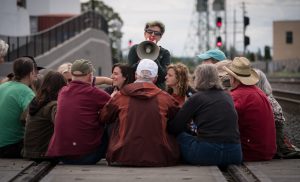Mosier Solidarity Rail Blockade
 On June 18th over 100 activists joined together to stop rail traffic in Vancouver, WA in protest of the continued dangerous oil-by-rail shipments. 21 courageous people, dubbed the Vancouver 21, were arrested after blocking the tracks for over three hours. Among those arrested were 350 PDX leaders Adriana, Bernadette, Barbara and David.
On June 18th over 100 activists joined together to stop rail traffic in Vancouver, WA in protest of the continued dangerous oil-by-rail shipments. 21 courageous people, dubbed the Vancouver 21, were arrested after blocking the tracks for over three hours. Among those arrested were 350 PDX leaders Adriana, Bernadette, Barbara and David.
At the pre-action gathering point, the Fire Chief of Mosier spoke to the crowd to get people hyped to resist oil-by-rail. From there everyone made their way to the tracks and gathered in a large circle spanning all the rail lines. There were a variety of colorful banners and signs. Then everyone sat down and a megaphone was at hand for people to come up and speak. Person after person stood up and spoke beautifully of their concerns for the environment, the safety of those who live near the passing oil trains and why they were occupying the tracks. There were teachers, some folks from Mosier and surrounding areas, and people of all ages.
A BNSF representative informed the gathering that they were trespassing on BNSF property and could be subject to arrest. Over the course of the next hour and a half, the Vancouver police announced a couple dozen times that the people on the tracks were trespassing and could be arrested. It seemed like BNSF was hoping they could convince or scare people to leave the tracks. They eventually brought a train yard engine with a couple cars attached right up to where people were sitting to try and intimidate those sitting in. BNSF repeatedly blew the horn, which is piercingly loud, leading some to put in earplugs.
 By that time, most of the people who were not there to be arrested stood to the side and the remaining 19 sat in a circle on the center track. One look at them and one could tell that they were resolute. Finally the police began to make arrests. 2 more people jumped into the circle bringing to total to 21.
By that time, most of the people who were not there to be arrested stood to the side and the remaining 19 sat in a circle on the center track. One look at them and one could tell that they were resolute. Finally the police began to make arrests. 2 more people jumped into the circle bringing to total to 21.
This action was planned in the wake of the devastating Union Pacific derailment in Moiser, OR that spilled around 42,000 gallons of oil. The train carried crude oil fracked from the Bakken Shale, some of which leaked into the Columbia River. The derailment caused a local elementary school to be evacuated and resulted in a fire that burned into the night. If there had been a slight change in the derailment location or wind, this disaster could have been much worse, resulting in many fatalities.
 In response to the derailment, elected officials including Portland Mayor Charlie Hales, Oregon Governor Kate Brown and Senators Jeff Merkley & Ron Wyden have called for a moratorium on oil trains in Oregon. A new report released on Thursday June 23rd reveals that Union Pacific is “solely responsible” for the Mosier derailment. “When it comes down to it, it’s Union Pacific’s failure to maintain its track led to this incident,” said Sarah Feinberg, who heads up the Federal Rail Administration.
In response to the derailment, elected officials including Portland Mayor Charlie Hales, Oregon Governor Kate Brown and Senators Jeff Merkley & Ron Wyden have called for a moratorium on oil trains in Oregon. A new report released on Thursday June 23rd reveals that Union Pacific is “solely responsible” for the Mosier derailment. “When it comes down to it, it’s Union Pacific’s failure to maintain its track led to this incident,” said Sarah Feinberg, who heads up the Federal Rail Administration.
While the call for a moratorium on oil trains in Oregon is a step in the right direction, we must work towards a permanent ban on oil if we want to preserve a livable climate!
We cannot afford to have any more Moisers! We must act to prevent this from happening again in our region. Now, there are proposals for new oil terminals in the Pacific Northwest which will bring a major increase in the amount of oil trains running through the region. Undoubtedly this increase will result in many more derailments and disasters like Mosier. If the Tesoro-Savage proposal is not denied by Governor Inslee, Vancouver will house the largest oil export terminal in all of North America. Further, the line going through Mosier, OR would see 5x the amount of oil train traffic if T-S is approved. Now is the only time to act to protect the safety of the Pacific Northwest.
It is well known that the climate is rapidly warming and ecosystems are destabilizing at an alarming rate. Last December in Paris, world leaders from 190 countries set a goal of limiting global warming to 1.5C. To meet this goal, we must begin an immediate phase out of all fossil fuels. For any hope of preserving a livable climate, 80% of known fossil fuel reserves need to stay in the ground. Very little time to act remains.
Fossil fuels reinforce social inequality. Disadvantaged communities bear disproportionate risk – oil train blast zones, pipeline routes, and drilling areas typically go through poor rural areas, low-income and often predominantly non-white neighborhoods (especially in big cities) endangering communities of color and low-income populations. In order to fight for social justice, we must act against fossil fuel companies and continue to resist the dangerous transportation of oil through the Pacific Northwest.
Want to support future actions against oil trains? Donate here



